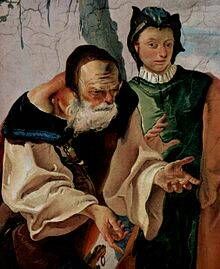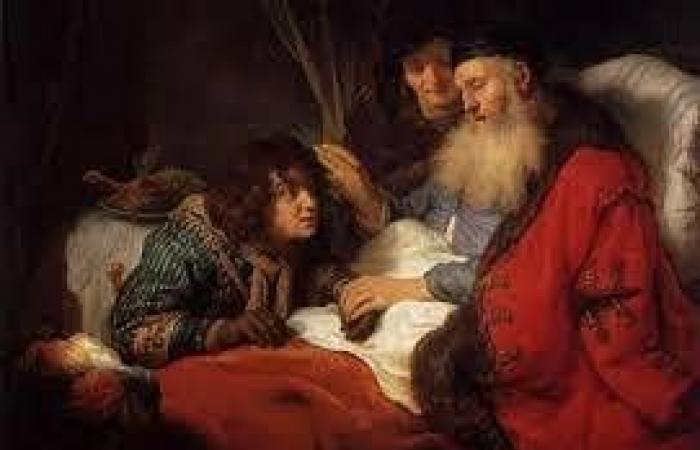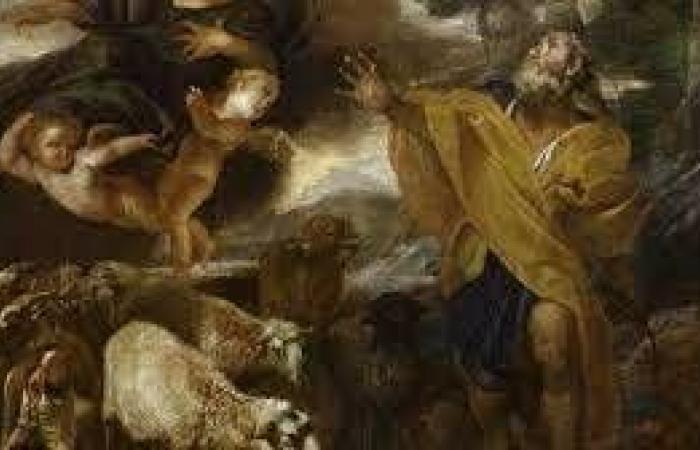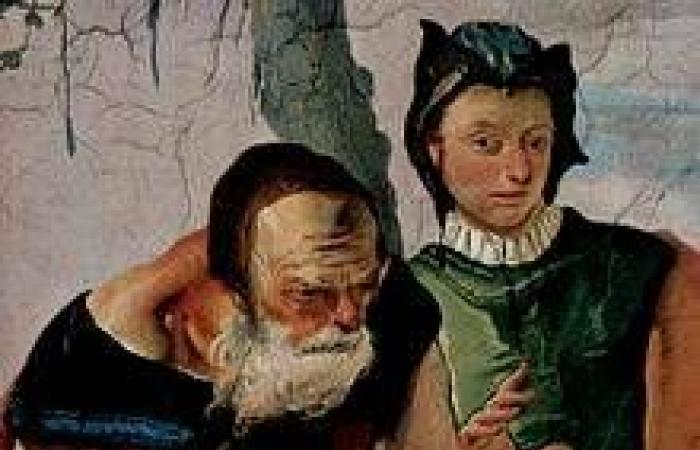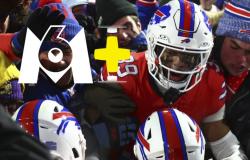Saint Jacob for the “All Saints Days” column of December 24th.
We remember December 24th Saint Jacob. According to Genesis (Gen 25.26) Saint Jacob is the son of Isaac and Rebekah, from whom the 12 tribes of Israel descend. The name derives from “ageb” that is “heel, heel”, in particular “to grasp by the heel or to supplant”, a name that was imposed on him because at the moment of birth, he held with his hand the heel of his twin brother Esau, born to first and therefore recipient of the birthright. His parents were the patriarch Isaac and Rebekahwho, being sterile, by virtue of the prayers addressed to God by her husband, became pregnant with twins at an advanced age; the two, already in the womb, clashed, almost as if to foreshadow the fraternal fights that would happen after their birth in the Land of Canaan. We read in Genesis (Gen 25-35) that Jacob managed to obtain the birthrights from his brother Esau in exchange for a plate of lentils, at a time when he was tired and hungry. The father, old and ill, wanted to impart the blessing of the patriarchs to the firstborn, so Jacob, taking advantage of Esau's temporary absence from the village and at the suggestion of his mother Rebecca, wore an animal fur, so as to be able to pass for his brother, who was very hairy; Isaac, now almost blind, did not notice the deception and gave the blessing to Jacob, believing him to be Esau. Since the blessing once given could not be taken back, the usurped he proposed to kill the usurper for vendetta. To save him, Rebekah sent Jacob to her father Bethel and her brother Laban in the Land of Paddan-Aram, also eager to find him a wife among her relatives, according to the law of endogamy, which prescribed not to marry women from other tribes in order to preserve the lineage of one's clan. So Saint Jacob departed; during the journey, near a place then called Luz, the man stopped and, taking a stone, rested his head on it and fell asleep. In his sleep he saw a scala which rested on the earth below and touched the sky above, on which angels ascended and descended; in the meantime, God from the top predicted to him that his descendants would be as numerous as the dust of the earth and that he would always keep him under his protection; Jacob vowed to always recognize him as his God and to return to that place to transform it into a sanctuary. Having arrived from Laban, the Saint fell in love with his cousin Rachel and asked her to marry his uncle who agreed on the condition that the young man worked for him as a shepherd for seven years, in order to be able to redeem her, according to the custom then in force in those lands. Once the established time had passed, however, the uncle, in the darkness of the night, had not Rachele brought into the groom's tent, but his eldest daughter Lia, completely veiled, who was still unmarried. The following morning, having discovered the deception, Laban justified his action to Jacob by saying that it was customary to marry the eldest daughter first, but that, after the wedding week, he would also grant him his beloved. The biblical text continues by narrating the tensions caused by this polygamous unionalso because Leah gave Jacob four sons – Reuben, Simeon, Levi and Judah – while Rachel was barren. So the woman resorted to the possibility of generate through a third partyoffering his own to Jacob slave Bilhah that he might have a son through her; thus Dan and Naphtali were born, then from Leah's slave, Zilpah, Gad and Asher; from Leah again Issachar, Zebulun and a daughter Dina. We read in Genesis that God then heard Rachel's prayers and made her fruitful: she gave birth to a son called Giuseppe. After twenty years, Jacob decided to return to Canaan, his homeland, hoping to obtain the forgiveness of his brother Esau. He went to meet him with four hundred men; the frightened Jacob, who however trusted in God's help, sent ahead of him in groups of flocks of goats, sheep, camels, heifers, donkeys and bulls, so that these gifts could appease his brother's anticipated anger. During the night an angel faced the patriarch and fought with him until dawn, then changing his name to Israel, since he had fought with God and men and had won. At dawn Esau appeared on the horizon with his numerous retinue and Jacob went to meet him, prostrating himself on the ground seven times; his brother hugged him and through tears they made peace. Jacob is present in other biblical passages and in particular in the stories of Joseph, a son whom he was able to embrace again in Egypt after having believed him dead and with whom he died at the age of 130. He was buried according to his will in the cave of Makpela in Canaan, which became the burial place of his ancestors Abraham, Sarah, Isaac, Rebekah and also of his first wife Leah.
Second the iconography traditional, Saint Jacob is portrayed in the most salient episodes of his long life. Artists have often created works with Jacob's Dream, depicting him sleeping and with a ladder of light behind him that goes towards the sky, crossed by angels. The theme of the blessing of Isaac also recurs, with the elderly patriarch lying on a bed and his arm resting on an armrest in the act of blessing with his right hand the young Jacob kneeling on a step of a ladder; Rebecca often appears in the scene, standing. Another context narrated in the painting is the meeting and reconciliation with Esau; finally, now old, the Saint also appears in the image story of Joseph's life.
